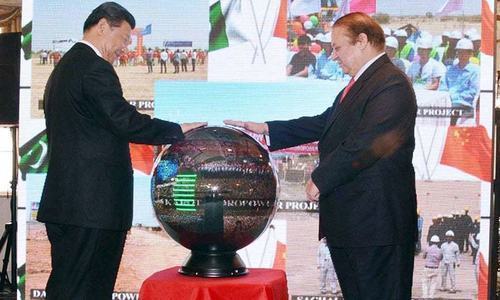KARACHI: Just about a week or so ago, I met Shafqat Hussain, who is known as Babu Bhai among the traders and buyers at Empress Market. His thoughts, though interesting, are not something that one would remember for long. Having been selling fish at the colonial-era market for the past several years, he referred to a growing number of Chinese buyers over the last few months and the resultant windfall. Though Empress Market is no stranger to foreigners, Babu Bhai said he has been catering to much more Chinese customers in recent days as compared to earlier.
“Not just this,” he went on, “Whenever I switch on the TV I notice a headline or two regarding China. When I pick up a newspaper, there is always front-page news of China. China is everywhere. What’s going on these days?”
Babu Bhai’s observations echo in my head as I go through one of the mainstream newspapers. The University of Karachi’s announcement about the degree programme on the Chinese language is the first headline to remind me of Babu Bhai’s words, followed by an invitation to Pakistan Tehreek-i-Insaf chief Imran Khan from the Chinese ambassador to visit his country. Then, there’s a proposal for a consultative forum for the trouble-free implementation of the crucial China-Pakistan Economic Corridor (CPEC).
These are just a few of the story threads. The question “what’s going on these days?” re-emerges as I ponder whether the fanfare about growing Pakistan-China relations over the media reflects reality. Curiosity takes me to a friend who arranges a meeting with Jack Chen, senior adviser to China’s Global Mining Limited — one of several companies engaged in the Thar coal project and, obviously, the CPEC as well.
The information shared by Jack indicates that there really is something going on as far as growing Chinese influence is concerned. Before meeting Jack it had been hard to imagine that the top men of China giants might be strolling down Saddar’s Zaibunnisa Street or the Cooperative Market to shop, or that they would be doing their groceries at Empress Market and visiting Karim Centre to get their shirts stitched.
“It happened only few months ago,” Jack says while talking about his experience of visiting Karachi frequently. “There were senior officials of the Shanghai Electric Corporation, the China Railway Corporation, the SinOceanic Shipping, China Hydropower and others. I took them to Saddar and we moved from one market to another without any security cover or protocol. It has been a wonderful experience to spend time here.”
Based in Islamabad, Jack is frequent visitor to Karachi. Like him, many of his countrymen have been living in Pakistan for the past several months due to their companies association with the CPEC. During the more than hour-long sitting, I encountered several times terms such as “trade revolution”, “game-changer” and “economic turnaround”, used by Jack whenever he referred to the completion of the CPEC project.
I am closing in to an answer to the question raised by Babu Bhai. The number of Chinese visitors to Karachi, like other parts of the country, has indeed been growing at a staggering pace as guessed by Jack; his understanding accords with the measures recently announced by the authorities.
In Aug 2015, the Sindh police claimed to have chalked out a comprehensive security plan for Chinese nationals and professionals visiting Karachi and other parts of the province for CPEC-related projects. Nearly six months ago, for 111 Chinese projects, the Sindh police were ensuring security to more than 1,500 nationals of the neighbouring country.
Jack, a former diplomat who has served in the North American, Asian and Middle Eastern regions, believes that the presence of his country’s companies has already started paying dividends for Pakistan’s economy.
And this is not just an assessment made by Jack. Fresh figures released by the State Bank of Pakistan suggest that China’s net foreign direct investment into Pakistan has grown by 120 per cent to $409 million in the past seven months of the current financial year, thanks to ongoing CPEC projects, which makes 63pc of the net FDI.
But what do the Chinese feel about the overall security situation in a beleaguered city which has become well-known not for the right reasons over the past many years?
Jack’s broad smile before his reply gives me an idea about his optimism. He quotes Mao Zedong to explain this “misperception”: “He [Mao] once said that if you want to know the taste of a pear, you must change the pear by eating it yourself. So whoever feels that there is a security threat in Karachi or Pakistan, they must visit this part of the world. This is a fantastic place, I must say. We don’t feel threatened here. And let me tell you, once this [CPEC] is done, it will remove all these negative perceptions about Pakistan.”
Published in Dawn, February 23rd, 2016


















































